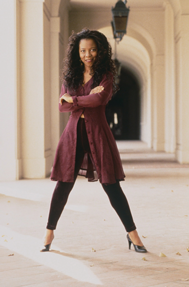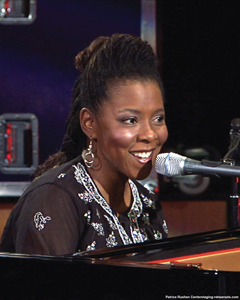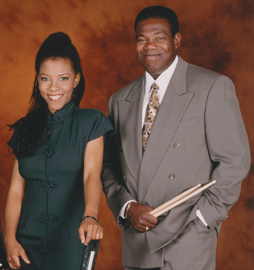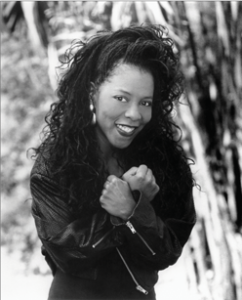 Pianist Patrice Rushen is the ultimate role model for young female musicians. Among her achievements, she was the first female music director for the Grammy Awards (2004-2006), first woman to serve as head composer/musical director of the Emmy Awards, as well as the first female music director of the NAACP Image Awards, PEople’s Choice Awards, and HBO’s Comic Relief.
Pianist Patrice Rushen is the ultimate role model for young female musicians. Among her achievements, she was the first female music director for the Grammy Awards (2004-2006), first woman to serve as head composer/musical director of the Emmy Awards, as well as the first female music director of the NAACP Image Awards, PEople’s Choice Awards, and HBO’s Comic Relief.
She’s composed musical scores for Emmy-nominated television shows and movies, plus the feature films Men in Black, Waiting to Exhale, Without You I’m Nothing, and Hollywood Shuffle. She released a total of 14 solo albums that earned her multiple Grammy nominations. Her music is frequently sampled.
The Local 47 (Los Angeles, CA) member is considered one of the world’s top jazz pianists and continues to perform and compose, while also teaching at two of the country’s most prestigious music schools: Thornton School of Music at University of Southern California (USC) and Berklee College of Music. Education has always been a priority for Rushen who recognizes the vital role it played in her life. She says her teachers, including high school music teacher Reggie Andrews, shaped her future in a big way.
“I think I always wanted to become a musician, I just didn’t know the pathway,” says Rushen. She began playing piano at age five, but says when she picked up the flute in middle school, it was life changing. “Being in the middle of all the sound in the orchestra and band, you are conscious of your entrances and exits and the whole production, in the context of a team; that informed me in a different way.”
Rushen says the all-black Los Angeles public school that she attended was ahead of its time. “The high school experiences opened the door for me to see what was possible. We were playing high school orchestra and jazz repertoire, but we were also playing jazz as America’s classical music. That sort of opened up the vocabulary for other forms of contemporary music.”
Students at the high school didn’t just learn about music in a classroom. Field trips included visits to local jazz clubs. “On a Friday night we’d sit in the back,” she says. “Everything sounded really good and the exploration was profound. I heard some of the most amazing jazz musicians in their environment—Cannonball Adderly, Freddie Hubbard, and [Local 802 (New York City) member] Herbie Hancock’s sextet.”
“ Some of the musicians were even coerced to come out to the school,” she recalls. “This was before jazz was institutionalized, particularly at the high school level. We had a lot of information firsthand. Bandleader Gerald Wilson, who lived in Los Angeles, would send us stuff to play; it was way over our heads, but the idea was for us to see the possibilities. That music pushed us.”
Some of the musicians were even coerced to come out to the school,” she recalls. “This was before jazz was institutionalized, particularly at the high school level. We had a lot of information firsthand. Bandleader Gerald Wilson, who lived in Los Angeles, would send us stuff to play; it was way over our heads, but the idea was for us to see the possibilities. That music pushed us.”
“The idea of being able to play music—all different kinds of music—and watch people react to it was supported by the entire school. It was an incentive to keep your grades up,” she says.
Aside from the music, Rushen’s high school gave her the fundamentals to succeed. “There was very clear consciousness towards a positive identity and the faculty supported that in the way they gave us information. They kept us busy all the time and everything was connected. If you were lucky enough to find your passion, you could learn a lot.”
“Preparation was a big deal,” she continues. “There’s luck, but luck is being prepared for the opportunity. That’s what Reggie used to tell us.”
Rushen’s first such opportunity came in her senior year when her combo won a chance to perform at the Monterey Jazz Festival. Her talents were noted by Fantasy Records, which offered the 17-year-old a recording contract on the Prestige label.
“I wasn’t really interested in a record deal; it wasn’t even on my radar at all,” says Rushen who was getting ready to enter college. “I was going to school, but I did need money.”
Rushen immediately joined the AFM. “I was very happy to join the union; it was like a milestone,” she says. “You have protection by belonging to a larger organization. It supports what we do with rules and regulations.”
Rushen’s very first album with Prestige, Prelusion, had her playing with established artists like Kenneth Nash, Joe Henderson, Hadley Caliman, Hubert Laws of Local 802, George Bohanon and Oscar Brashear of Local 47, plus contemporaries Ndugu Chancler of Local 47 and Tony Dumas.
“I began playing with a lot of different people, especially when the record came out. I would play with a lot of studio musicians who would play the clubs when they weren’t working,” she says. That’s where she met and befriended people like Local 47 members Lee Ritenour, Harvey Mason, and Abe Laboriel.
 Though there were offers for her to tour, she was firmly focused on college. Film composing was her goal, but her parents insisted she major in music education. “At the time, USC had no jazz, and certainly no contemporary or popular music major,” she explains. She says the broad curriculum of the music education program served her well later on.
Though there were offers for her to tour, she was firmly focused on college. Film composing was her goal, but her parents insisted she major in music education. “At the time, USC had no jazz, and certainly no contemporary or popular music major,” she explains. She says the broad curriculum of the music education program served her well later on.
“A music director has to be able to see the big picture and understand the components that will make it happen. You need to know the goal of the presentation and then break it down into what it is going to take to make it happen—casting the correct people and empowering them through your direction.”
“It helps if you are able to work well under pressure and don’t sweat the small stuff,” she adds. “Respect is a given. When people feel like you care about them, they care about you, and want to help you. You also need awareness of a lot of different styles and the resources to pull the essence out of those styles.”
Rushen’s first big job was composing for Robert Townsend’s first movie, Hollywood Shuffle. “He didn’t know who any of the composers were. He went around to different agencies and my name was at the bottom of the list, in pencil,” she laughs. “He knew me because of my records. He said, ‘I want her,’ and the agents were probably horrified!”
“From that movie, I got five HBO comedy specials [as music director],” she says, adding that the role of music director served as a showcase for the skillset she had developed. Word got out, and that led to more work.
While being a woman never kept her from pursuing her ambitions, she’s sure there were jobs along the way that she didn’t get because of gender bias. Then, there were a few people who made the leap that she was a man. “I’ve had some surprised looks because my name doesn’t necessarily give it away,” says Rushen. “There’s the female thing, and then there’s the African American thing that sometimes comes as a surprise.”
Among other challenges, she points to the balancing act that women often struggle with. She advises young women to go for it. “Be strong in your resolve to be as good as you possibly can be. Then, don’t be afraid to let your priorities shift as your life changes and allow yourself the possibility of a family life. Understand that now, more than ever, a career in music involves lots of different layers and different related skills. If you build on that set of skills, you will always find something to do that’s musical. You don’t have to sacrifice any of it.”
As her own career has evolved, she has taken on more teaching roles, but she doesn’t see it as a huge shift from performing. “I don’t really see those things as mutually exclusive,” she says. “When you perform, you are teaching. There is always somebody out in the crowd whose approach could be modified or changed on the basis of a performance they hear.”
 “I think teaching is important,” she says. “I’m fortunate to have had great teachers. They were all really open to the communication of music and using the piano as a kind of media, teaching great technique to give you the ability to play anything.”
“I think teaching is important,” she says. “I’m fortunate to have had great teachers. They were all really open to the communication of music and using the piano as a kind of media, teaching great technique to give you the ability to play anything.”
Rushen is currently chair of Popular Music at Thornton, plus Ambassador for Artistry in Education at Berklee. “All of my different experiences have impacted my methodology and I can call on that as a teacher,” she says. “I’m teaching a music style that I lived—popular music—that’s informed by a certain tradition. It’s exciting for me to find a pedagogy that teaches and celebrates that.”
For Rushen, teaching is as much inspiration as it is instruction. “When you teach you are learning at the same time. I think artists are perpetual students, you know? You are always soaking it up. The inspiration and understanding of what it takes to make art takes you out of yourself. It’s a beautiful thing to be able to communicate on that level.”
Rushen is also involved with youth programs, including USC and Berklee outreach programs, a jazz mentorship program in Los Angeles area high schools, and work with the Young Musicians Choral Orchestra in the Bay Area. “This is an amazing organization that takes at-risk youth and puts them in an environment where they can thrive as musicians,” she says.
During the school year, Rushen’s focus is mostly on her students. Summer allows her to travel and take on other projects. This summer she’ll play some gigs as Patrice Rushen & Friends with Local 47 members Eric Marienthal (sax), Paul Jackson, Jr. (guitar), Reggie Hamilton (bass), and Ndugu Chancler (drums).
“We have some dates sprinkled throughout the summer, which is kind of cool because it allows everybody to do their own thing,” she says.

